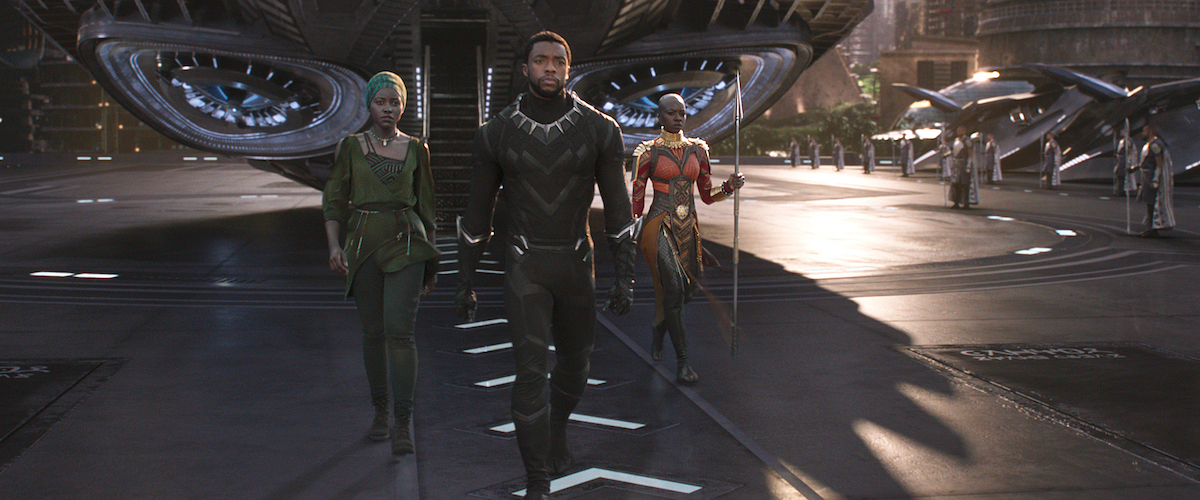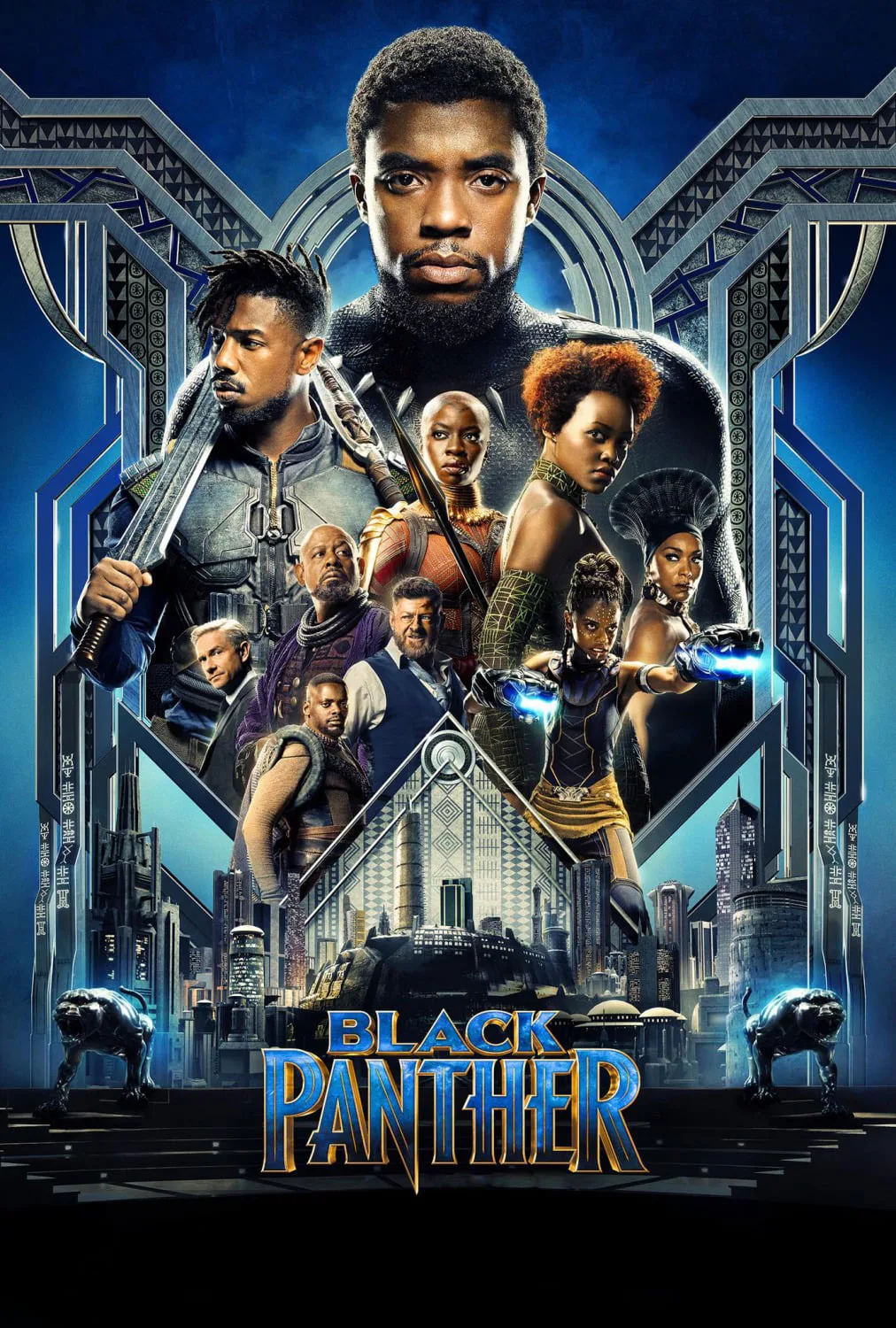In 1992, a little Black kid on a makeshift basketball court in Oakland, California disrupts his game to glance up at the sky. Figuratively, he's looking at the loss of hope, a departure represented by glowing lights drifting away into the night. As we learn later, those lights belong to a futuristic flying machine returning to the mysterious African country of Wakanda, the setting of "Black Panther." The young man was once told by his father that Wakanda had the most wonderful sunsets he would ever see, so he cradles that perceived vision of beauty through his darkest hours. When he finally sees the sun go down over Wakanda, it provokes a haunting emotional response.
That same response will be felt by viewers of "Black Panther," one of the year's best films, and one that transcends the superhero genre to emerge as an epic of operatic proportions. The numerous battle sequences that are staples of the genre are present, but they float on the surface of a deep ocean of character development and attention to details both grandiose and minute. Wakanda is a fully fleshed-out, unapologetically Black universe, a world woven into a tapestry of the richest, sharpest colors and textures. Rachel Morrison's stunning cinematography and Ruth Carter's costumes pop so vividly that they become almost tactile. You can practically feel the fabric of the hat worn by Angela Bassett as it beams in the sunlight on the day her son becomes king.
Bassett is just one of numerous familiar and up-and-coming actors of color who bring their A-games to "Black Panther." Forest Whitaker, Sterling K. Brown and "Get Out" star Daniel Kaluuya are just a few of the others. The entire cast creates characters with complexities rarely afforded minorities in cinema; these people are capable of contradictory human responses that have lasting consequences. Their feelings are deep, instantly relatable, and colored with the shades of grey not often explored in blockbuster entertainment. When the villain still manages to make your eyes tear up despite trying to murder the hero in the previous scene, you know you're in the presence of great acting and storytelling.
The villain in question, nicknamed Killmonger, is played by Michael B. Jordan. Someday, the team of Jordan and writer/director Ryan Coogler will be mentioned with the same reverence reserved for Scorsese and De Niro. The duo have done three films together, and though this is the first where Jordan is in a supporting role, they still convey a cinematic shorthand that's representative of their trusted partnership. A film like this is only as good as its villains, and Jordan deserves a place in the anti-hero Hall of Fame alongside such greats as Gene Hackman's Little Bill Daggett from "Unforgiven." Like Hackman, Jordan lures you in with his likeable comic swagger before revealing the shocking levels of his viciousness. He is hissable, but his character arc is not without sympathy nor understanding.
Coogler is the perfect fit for this material. It hits all the sweet spots he likes to explore in his films. So much gets written about which prominent directors should helm a superhero film next, but relatively few would be allowed to leave such a personal mark on a product so slavishly devoted to fan feelings. Coogler turns the MCU into the RCU—the Ryan Coogler Universe—by including everything we've come to expect from his features in the script he co-wrote with Joe Robert Cole. Like Oscar Grant in "Fruitvale Station," T'Challa (Chadwick Boseman) is a typical Coogler protagonist, a young Black man seeking his place in the world while dealing with his own personal demons and an environment that demands things from him that he is unsure about giving. Like Donny in "Creed," T'Challa exists in the shadow of a late father once known for a greatness he also wishes to achieve through similar means.
Coogler extends these same character traits to his muse Jordan's Killmonger who, true to comic book lore form, has a "two sides of the same coin" relationship with the hero. Even their plans apply this theory. T'Challa wants to keep Wakanda away from the rest of the world, protecting his country by using its advanced technology solely for its denizens. Killmonger wants to steal that technology and give it to others, specifically to underprivileged Black folks so they can fight back and rule the world.
Additionally, the dual, reflective imagery of T'Challa and Killmonger is beautifully drawn to the surface in a scene where both men undergo the same spiritual journey to visit the fathers they long to see. But these similar journeys are polar opposites in tone, as if to prove the adage that one man's Heaven is another man's Hell. These scenes have a way of burrowing into your skin, forcing you to reckon with them later.
Coogler's universe also isn't male-dominated. In each of his films, there are women who advise and comfort the male leads while still having their own lives and agency. In "Fruitvale Station," it's Octavia Spencer's Mrs. Grant; in "Creed," it's Tessa Thompson's artistic girlfriend. "Black Panther" really ups the stakes, presenting us with numerous memorable, fierce and intelligent women who fight alongside Black Panther and earn their own cheers. Lupita Nyong'o is Nakia, the ex for whom T'Challa still carries a torch. Letitia Wright is Shuri, T'Challa's sister and the equivalent of James Bond's Q; she provides the vibranium-based weapons and suits Black Panther uses. And Danai Gurira is Okoye, a warrior whose prowess may even outshine T'Challa's because she doesn't need a suit to be a badass. All of these women have action sequences that drew loud applause from the audience, not to mention they're all fully realized people. Okoye in particular has an arc that replays Black Panther's central ideological conflict in microcosm.
For all its action sequences (they're refreshingly uncluttered, focusing on smaller battles than usual) and talk of metals that exist only in the mind of Stan Lee, "Black Panther" is still Marvel's most mature offering to date. It's also its most political, a film completely unafraid to alienate certain factions of the Marvel base. It's doing a great job upsetting folks infected with the Fear of a Black Planet on Twitter, to be sure. To wit, Wakanda has never been colonized by White settlers, it's the most advanced place in the universe and, in a move that seems timely though it's been canon since 1967, Wakanda masquerades as what certain presidents would refer to as a "shithole nation." Coogler really twists the knife on that one: In the first of two post-credits sequences, he ends with a very sharp response about what immigrants from those nations can bring to the rest of the world.
Speaking of endings, Coogler is a man who knows how to end a movie. His last shot in "Creed" is a tearjerking thing of beauty, and the last scene (pre-credits that is) in "Black Panther" made me cry even harder. As in "Creed," Coogler depicted young brown faces looking in awe at a hero, something we never see in mainstream cinema. "Black Panther"'s last scene is a repeat of the scene I described in my opening paragraph: In the present day, a little Black kid on a makeshift basketball court in Oakland, California disrupts his game to glance up at the sky. Figuratively, he's about to gain some hope, an addition represented by a humanitarian hero with much to teach him and his fellow basketball players. The young man stares in awe, realizing that his life, and the lives of those around him will be changed.
It's an ending rife with meta, symbolic meaning. Starting this weekend, a lot of brown kids are going to be staring at this movie with a similar sense of awe and perception-changing wonder. Because the main superhero, and almost everyone else, looks just like them. It was a long time coming, and it was worth the wait.




















